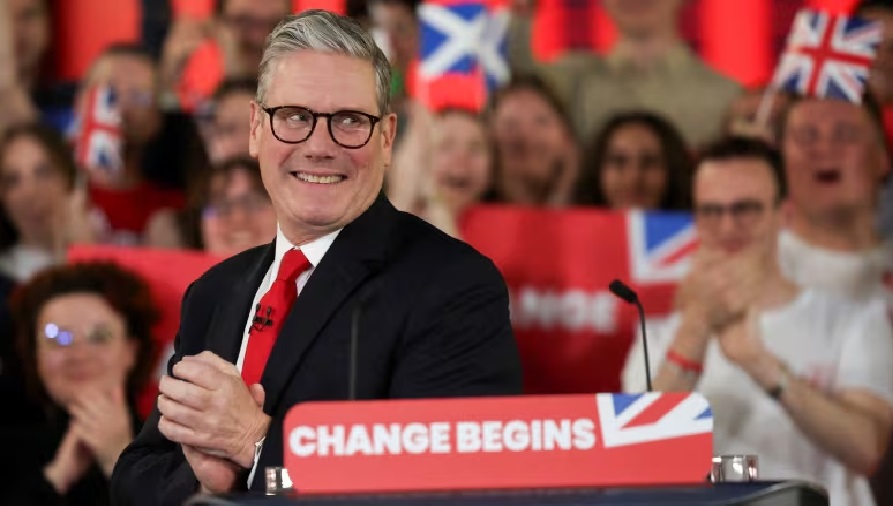Keir Starmer triumphantly declared that “change begins now” after his Labour Party secured a landslide victory in the United Kingdom’s general elections, ending 14 years of Conservative rule. This historic win signals a shift in British politics, with Starmer set to become the new Prime Minister. However, despite pledging a fresh approach to domestic economic issues and the cost-of-living crisis, Starmer’s government has indicated it will maintain the outgoing administration’s robust military and diplomatic support for Ukraine in its ongoing conflict with Russia.
While Labour has hinted at a more conciliatory tone towards the European Union, the party has assured NATO and other allies that London will continue to view Russia as a significant threat to Europe. Ukrainian President Volodymyr Zelenskiy welcomed the continuity, expressing gratitude to the outgoing Conservatives and congratulating the incoming Labour government on its “convincing election victory.”
“Ukraine and the United Kingdom have been and will continue to be reliable allies through thick and thin,” Zelenskiy wrote on social media. “We will continue to defend and advance our common values of life, freedom, and a rules-based international order.”
Starmer, a 61-year-old former lawyer who took over Labour’s leadership four years ago, is expected to visit Buckingham Palace to see King Charles and formally begin his tenure as Prime Minister.
A Mandate for Responsibility
Addressing supporters at dawn, Starmer emphasized the responsibility that comes with such a mandate. Outgoing Conservative Prime Minister Rishi Sunak, a staunch supporter of NATO and Ukraine, expressed gratitude for the “steadfast support” and “shared achievements” during his tenure, including the supply of tanks, Storm Shadow missiles, and F-16 training for Ukrainian pilots.
David Lammy, anticipated to be the new Foreign Secretary, predicted that Labour’s return to power would bring a foreign policy of “progressive realism.” He emphasized the need to “turn the page on 14 years of Tory chaos,” with Labour aiming to reconnect with Europe, address climate change, and engage more with the Global South.
On defense, Starmer and Labour have described their commitment to NATO’s role in transatlantic security as “unshakable.” They have pledged “steadfast” support for Ukraine, including military, financial, diplomatic, and political backing, and a path toward NATO membership for Ukraine.
Consensus on Foreign Policy
Olivia O’Sullivan, director of the U.K. in the World Program at Chatham House, noted the surprising consensus between Labour and the Conservatives on foreign policy, particularly regarding Ukraine. “There are many ways in which the foreign policy positions of the Labour Party are not that distinct from the Conservatives,” she said, highlighting the shared commitment to supporting Ukraine.
Estonian Prime Minister Kaja Kallas, who is expected to assume the EU’s top diplomatic post, congratulated Starmer on his victory and praised the U.K.’s commitment to common security. “I’m sure our excellent cooperation will only continue to thrive,” she added.
Starmer has indicated his intent to meet with Zelenskiy early in his leadership and has described Russian President Vladimir Putin as “the aggressor in Ukraine.” He emphasized the importance of a united front in supporting Ukraine, a stance that will be tested at NATO’s 75th anniversary summit in Washington on July 9-11 and at the European Political Community Summit at Blenheim Palace on July 18.
Domestic Challenges Ahead
British voters turned to Labour seeking relief from the economic woes and stagnation that have followed the COVID-19 pandemic and Russia’s invasion of Ukraine. Labour’s victory saw the party surpass the 326 seats needed for a working majority in the House of Commons, gaining well over 200 seats as the Conservatives lost an even higher number.
In his concession speech, Sunak acknowledged Labour’s victory and congratulated Starmer. Right-wing populist Reform Party leader Nigel Farage also won a seat for the first time, reflecting a broader right-wing surge in the recent European Parliament elections.
As Starmer prepares to lead, he faces the dual challenge of addressing domestic economic issues while maintaining the UK’s strong international stance, particularly in supporting Ukraine. The new government’s actions in the coming weeks will be crucial in solidifying its leadership and addressing both domestic and global challenges.
